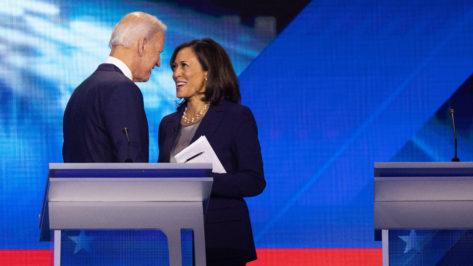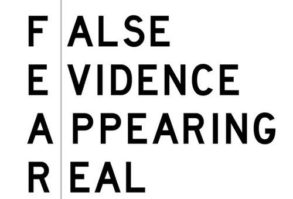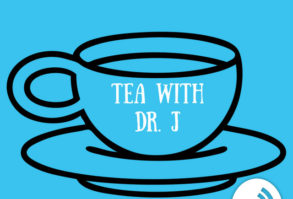On August 11, 2020, Joe Biden made history by naming, Kamala Harris, as his vice-president pick.
I said during last year’s primaries that Senator Kamala Harris is a force to be reckoned with. She has the star power and potential for a high-profile, celebrity politician status. She can draw a crowd–which is essential in today’s political culture.
The one challenge Senator Harris will have is how the media and overall, the American voter, will talk about her. Media coverage for female candidates is biased.
The 2020 campaign started with more women running than in any prior election. Women in politics are having a moment. This election can become the election where the image of leadership changes the face of the presidency.
The Original Iron Lady
In 1979 Margaret Thatcher became the first woman prime minister of England.
According to Rebecca Richards in her article, Cyborgs on the World State: Hillary Clinton and the Rhetorical Performance of Iron Ladies, it is initially believed that the Kremlin nicknamed her Iron Lady to demean her. A former soldier working for the Red Army’s Red Star newspaper added the nickname to a headline.
Instead of demeaning Margaret Thatcher—it empowered Margaret Thatcher.
Opponents thought it was perfect for highlighting her stubbornness. Thatcher’s supporters loved that it was a sign of her strength.
Thatcher made “The Iron Lady” a rhetorical performance. Rebecca Richards points out that Thatcher could fuse her femininity and tough rhetoric. That fusion became her identity and rhetorical strategy. Thatcher would not be bullied or forced into anything.
So, could Kamala Harris adopt that Iron Lady persona while Vice-President? No one in American politics has lived up to that rhetorical image-not even presidential nominee Hillary Clinton. Yet, time and time again, Kamala Harris shows her strength while questioning men in power.
Rebecca Richards explains, “The rhetorical performance of the Iron Lady identity becomes the vehicle to appropriate these imagined qualities of national manhood into a woman who biologically cannot possess them.”
If women are going to be named such things as Iron Lady, Richards says women leaders need to know the ways that name works for and against them.
To embrace the name such as Iron Lady—Thatcher knew who she was. She was a woman who wore a dress, makeup, and whose rhetoric could just be as militaristic as a male’s.
Thatcher taught female politicians that they are wise to mold themselves into male behaviors, but they do not have to sacrifice their femininity.
Kathleen Hall Jamieson reminds us we are used to frames, “Structures underlying the depictions that the public reads, hears, and watches.”
We learn these frames from watching and listening to media representations repeatedly.
The press is a storyteller. But, so are politicians.
Kathleen Hall Jamieson explains, “The stories that journalists tell and the lenses that color their interpretation of events can sometimes dull their fact-finding and investigative instincts.”
The more women see women represented in leadership positions is when women can SEE themselves in such situations. And so can others. We have to train our brains that gender does not matter in leadership roles.
The Pew Research Center found that 73% of women believed it’s easier for men to get elected.
More women said women are held to higher standards than men and that many American’s are not ready to elect a woman to a higher office.
Pew also found that more women believed women worked out compromises better and were more ethical. But, 18% of women compared to 15% of men thought family responsibilities don’t leave time for politics.
And, no shock here, the survey said more Democrats were more receptive to a female president than Republicans.
Stereotypes
Stereotypes are how we categorize and frame such things as gender, cultures, sexuality, and ethnicity.
In Karrin Anderson’s article, Rhymes with Blunt: Pornification and U.S. Political Culture, she argues that pornification frames signal a backlash against the gains women have made in the US political system.
Anderson explains, “When male candidates are pornified, they are typically still cast in positions of power. Jokes about Bill Clinton situated him in the Oval Office with a woman hiding under his desk; the tabloid photo of a shirtless Barack Obama immortalized in the “I got a crush’ viral video was intercut with images of a swooning, scantily clad groupie pole dancing on a bus.”
Anderson found that males are seen as having agency, and women are seen as being acted upon. The stereotypical power dynamics.
In October 2016, Trump’s infamous bus tape was leaked, where he revealed he could grab any woman’s private parts and get away with it.
Trump’s campaign framed it as mere locker room talk. “This is how males talk in private.” The stereotypical frame was that Trump is in a position of power, and women acted upon willingly without his permission to do so. The tape did very little to harm his campaign.
As more women hold positions of power in our country, the web recycles these pornified images and the many words that describe these women in power in not so flattering terms.
Women are stereotypically seen as not being aggressive enough to defeat a man. And, if Trump believes a woman is aggressive, Donald Trump likes to call her “Nasty.”
In a poll by Georgetown University, May the Best Woman Win? Education and Bias against women in American Politics found bias against women in politics has declined, but 13% still doubt most women’s emotional suitability for politics.
The poll also found that the higher the education level, the more favorable they viewed women in politics.
Education is key to changing stereotypes.
As long as there are reality shows like The Bachelor or The Real Housewives, women will still be considered emotionally unstable. Until we change HOW the media portrays females, the change will occur sooner than later.
Media literacy education will help break through the gender stereotypes media forces on us daily.
The Double-Bind
Kathleen Hall Jamieson discussed in her 1995 book Beyond the Double Bind what women faced when it comes to seeking leadership roles.
On page 16 of Beyond the Double Bind Jamieson’s list included:
- Women can exercise their wombs or their brains, but not both.
- Women who speak out are immodest and will be shamed, while women who are silent will be ignored or dismissed.
- Women are subordinate, whether they claim to be different from men or the same.
- Women who are considered feminine will be judged incompetent, and women who are competent, unfeminine.
- And, finally, as men age, they gain wisdom and power, as women age, they wrinkle and become superfluous.
When Geraldine Ferraro accepted the Vice President nomination at the 1984 Democratic Convention, she told her daughter not to cry so she would not cry. Ferraro said, vice presidents are seen as tough, and cannot cry.
We all build these stereotypical frames into our heads because they are traditional images of how we were taught to think. Granted, women have broken through some of these barriers since more women are not staying at home, but have careers of their own.
A generation is growing up without their mothers at home. Girls see their mothers as role models. With more education, with more powerful role models, women won’t be judged incompetent if they are wearing a dress while ordering an airstrike.
Sarah Palin became the first vice presidential pick for the Republican party in 2008. A New York Times article questioned if she could handle being a mom to young children and being vice president. One quote asked,
“How is this really going to work?” said Karen Shopoff Rooff, an independent voter, personal trainer and mother of two in Austin, Tex. “I don’t care whether she’s the mother or the father; it’s a lot to handle,” she said, adding that Ms. Palin’s lack of national experience would only make her road more difficult.
This quote that the article included may never have been a concern if a man with a young family and a child with Downs Syndrome were chosen for vice-president. Then-Senator Barack Obama had two young daughters and was running for office against John McCain and Sarah Palin. This voter did not question his ability to do his job and raise a family.
Women such as Geraldine Ferraro and Hillary Clinton never had such concerns because their children were grown.
In Hillary Clinton’s book What Happened, Clinton discusses women in politics. She writes,
If we’re too soft, we’re not cut out for the big leagues. If we work too hard, we’re neglecting our families. If we put family first, we’re not serious about the work. If we have a career but no children, there’s something wrong with us, and vice versa. If we want to compete for a higher office, we’re too ambitious.
Senator Kamala Harris Makes No Apologies
During Joe Biden’s VP search, Senator Chris Dodd asked Kamala Harris if she had remorse going after Biden in the primary debates.
Watch this exchange from 2019:
“She laughed and said, ‘that’s politics.’ She had no remorse,” Dodd told a longtime Biden supporter and donor, who relayed the exchange to POLITICO on condition of anonymity.
Do you think a man would have remorse in the same situation? No, he would not. Nor would a male politician ask this question to another male politician. The rhetoric to describe Senator Kamala Harris’ political trustworthiness was being questioned before the official announcement.
As Clinton described in her book:
Historically, women haven’t been the ones writing the laws or leading the armies and navies. We’re not the ones up there behind the podium, rallying crowds, uniting the country. It’s men who lead. It’s men who speak. It’s men who represent us to the world and even to ourselves.
That’s why when Senator Kamala Harris took aim at Vice President Joe Biden, Harris was seen as too ambitious to many people, especially to the male politicians in her own party. When, in fact, it was JUST POLITICS.
Women as presidential candidates fighting for a spot at the table, as Kamala Harris was doing in the debate shown above, was doing what male politicians have been doing for decades. Debating.
The difference. She’s a woman debating a man. And, our society is not used to that scenario.
In that debate moment, Harris was fighting for the Democratic presidential nomination. Yes, she was ambitious, like everyone else on that stage, who was just as ambitious.
When former Vice-President Joe Biden announced Kamala Harris as his VP choice, it was a historic moment. For several reasons including:
- Gender
- Race
- Professional background
My question is, how will the media talk about this historic decision? I already talked about the double-bind. A strong, smart, sophisticated, independent, Black/Asian- American/Indian woman is previously called too ambitious and nasty.
The newspaper headlines the next day across the country included:
The Dallas Morning News: Biden Picks Harris: California senator a winner but has been polarizing figure.
The Washington Post: In historic move, Biden selects Harris for VP: Black women express overwhelming level of joy
The New York Times: Harris Joins Biden Ticket: achieving a first
Political Warrior Shaped by Life in 2 words
The Boston Globe: A GROUNDBREAKING VP PICK: Harris is first woman of color on a presidential ticket as Biden chooses a past rival who had clashed with him
Wisconsin State Journal: 1st Black Woman as VP Pick: Trump says Democrats ‘embrace the radical left
I find it interesting that Wisconsin State Journal decided to include Trump’s quote about embracing the radical left when Kamala Harris’ politics is far from the radical left. I believe Bernie Sanders may be offended since he owns that spot.
I also found it interesting that The Dallas Morning News called her polarizing and that The Boston chose to include “past rival who clashed” in their headlines.
One Hit Wonder Trump
Donald Trump has a history of calling women NASTY when he feels they are too aggressive. Trump did not like Harris’ questioning of then-Supreme Court Justice nominee Brett Kavanaugh:
From Judge Kavanaugh confirmation hearing, Sen. Kamala Harris asks Judge Kavanaugh: “Can you think of any laws that give government the power to make decisions about the male body?” pic.twitter.com/HbmkmIzuJg
— CSPAN (@cspan) August 11, 2020
As Mr. Trump insulted Ms. Harris on Tuesday, he peppered his usual misogynistic “nasty” trope with more name-calling, referring to her as the “meanest, most horrible, most disrespectful” member of the United States Senate.
With that, Ms. Harris joins a group of women Mr. Trump feels have not been adequately compliant.
He used the “nasty” insult most infamously with his former Democratic rival for the presidency, Hillary Clinton — “such a nasty woman,” he muttered from across the stage as the two were engaged in a presidential debate. Senator Elizabeth Warren of Massachusetts, a former Democratic presidential hopeful and vocal critic, was deemed to have a “nasty mouth.” House Speaker Nancy Pelosi? “She’s a nasty, vindictive, horrible person.”
Even Meghan Markle, the American-born Duchess of Sussex, was deemed “nasty” for not supporting his 2016 candidacy.
“What can I say?” Mr. Trump told a British tabloid last year, just ahead of a visit to the United Kingdom, where he was hosted by the royal family. “I didn’t know that she was nasty.”
Donald Trump’s uses these stereotypical nicknames to reinforce his audience’s stereotypes against females and minorities repeatedly. Repetition is Trump’s rhetorical weapon of choice to introduce and reinforce stereotypes against his opponents or who he considers enemies.
It should be noted, Trump and his daughter both donated to Kamala Harris’ California Attorney General campaigns.
Biden and Harris
Kamala Harris has to do what Thatcher did. She has to make no apologies (only when warranted), and she has to own her strong rhetoric. She is the woman who can be feminine, all while ordering military actions.
Kamala Harris challenged Joe Biden during that 2019 primary debate. She wanted him to think about what it might have been like on her side of reality. Biden’s choice to pick Kamala Harris shows he wants someone to challenge him on issues. She can help heal America that many others would not achieve. Harris lived Law and Order. She can reach across racial lines and say, I understand. Her rhetorical style is both empathetic and tough. We need a vice-president who will make our president THINK.
“Yes” Men are dangerous.
Kamala Harris is no yes man. And, Joe Biden understands this and it’s why he chose her.





